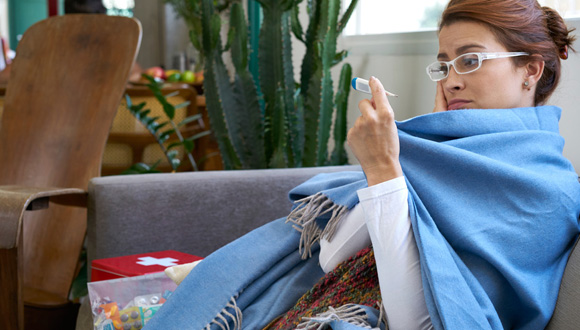Anyone can get COVID-19 — especially those who are not yet vaccinated.
But not everyone battles the same symptoms — or severity of symptoms — while ill with this virus. Some people get seriously sick and require specialized care in an emergency room or hospital
Most people, though, experience mild symptoms that can be self-treated in isolation at home.
Self-isolating is the first step if you've tested positive for COVID-19. But then what?
You're probably already a pro at fighting a cold or the flu, but here's what you need to know about treating a mild case of COVID-19 at home.
What medicine do I take for COVID-19?
While vulnerable individuals may have access to monoclonal antibody therapy and may soon have access to antivirals for COVID-19, otherwise healthy people don't have access to medication specific to treating a mild case of COVID-19. That's OK, though, since a mild case of COVID-19 can be managed at home, although you should be sure to monitor your symptoms in case they worsen.
To self-treat your COVID-19 symptoms at home, focus on:
1. Getting plenty of rest. While fighting a new virus, expect your body to be busy. By giving yourself plenty of time to rest, you'll help provide your body with the energy it needs to get the job done.
2. Drinking plenty of water. Making sure you're adequately hydrated can help alleviate several symptoms. Fevers are usually accompanied by increased sweating, and drinking lots of water can help replenish the extra water you're losing — preventing dehydration. If you have a dry cough, a teaspoon of honey in hot water can help soothe your throat. If you have congestion, a warm, non-caffeinated beverage or warm shower can help loosen mucus. In addition, ensuring you stay well-hydrated can aid your immune system as it fights off the virus.
3. Using over-the-counter medications when necessary. If you have a high fever, you can take a fever reducer, such as acetaminophen, to help bring it down. If you have body aches, a sore throat or cough, a pain reliever can help lessen the discomfort these symptoms can bring. You may also consider taking a nasal decongestant for a stuffy nose and an expectorant for chest congestion. Just be sure to follow the dosage recommendations on the bottles and don't take any medications that may conflict with any other medications you're taking or any health conditions you may have.
And, remember, isolating means not leaving your home. If you need medications or other supplies to help you feel more comfortable, use a non-contact delivery service or ask a loved one or friend to deliver anything you may need to your doorstep.
The symptoms that come along with a mild to moderate case of COVID-19 can last anywhere from a few days to a week or more — with most people recovering from symptoms within two weeks.
In the meantime, and in addition to the steps listed above, make sure you're monitoring your symptom severity and know when worsening symptoms mean you need medical care.
When are COVID-19 symptoms considered severe?
With everything you've read about COVID-19 over the last few years, having COVID-19 can certainly rachet your stress level up a notch.
If you have any questions or if you need advice or an opinion about the severity of your symptoms, call your doctor or use virtual urgent care.
In addition, know that mild or moderate symptoms can progress into severe symptoms or complications. It's important to monitor for worsening symptoms and seek emergency care if you experience any of the following:
- Difficulty breathing
- Persistent chest pain
- Inability to stay awake or new confusion
- Bluish lips or face
Call 911 immediately if you notice any of these emergency warning signs.
How can I make sure I don't infect others in my household?
Because COVID-19 primarily spreads from person to person through close contact, it's important to not only isolate at home, but also to isolate yourself as much as possible from others in your home.
Sharing a home safely while you have COVID-19 can be tricky — especially if you live in close quarters. But here are tips that can help:
- Avoid contact with members of your household, including pets
- Do not prepare food for others
- Avoid sharing common spaces and personal items
- Wear a mask while around others and wash your hands before and after any interaction
- Stay in a separate bedroom and use a separate bathroom, if possible
If you live with someone who has COVID-19, you may want to take precautions as you share a home with someone who's sick (without getting sick yourself).
How long do I need to isolate?
The criteria for ending isolation varies from person to person, so be sure you understand what your isolation timeline needs to look like.








